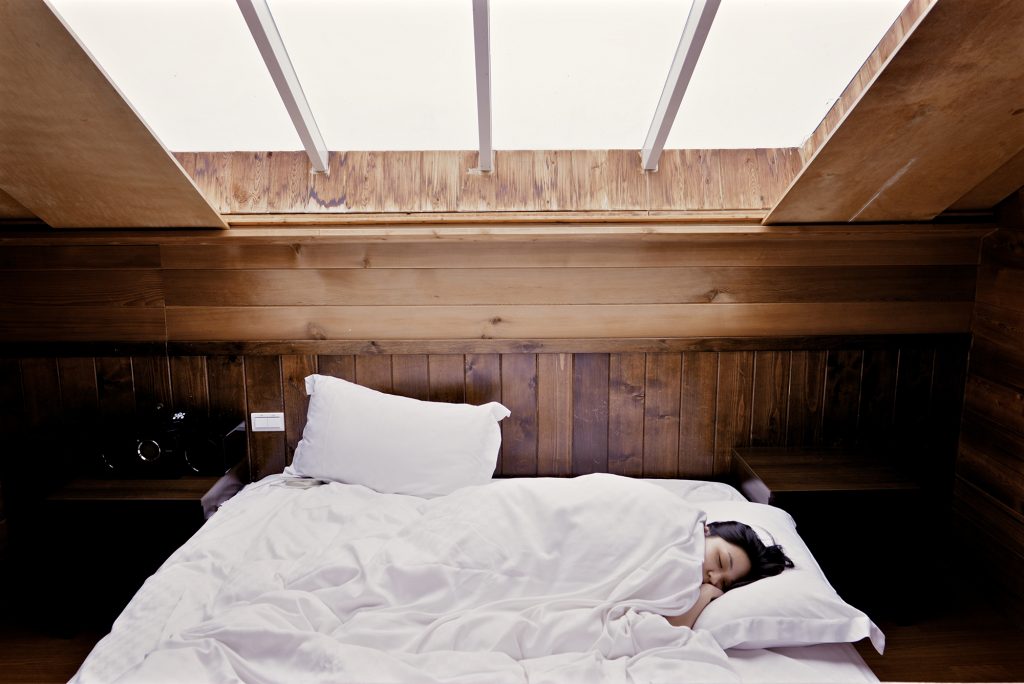Sleep Better to Live Better

With Daylight Savings coming up this weekend, I have been thinking about ways to truly save the amount of time in my day. But it’s no surprise that making the most of the daylight always comes back to being rested from the nighttime. Therefore, I’m sharing my personal tips for getting better, deeper and more effective sleep.
1. Routine
Try to set a sleep schedule for yourself that is achievable and easy to follow. Start by figuring out what time you need to wake up in order to mentally prepare yourself for the day and then subtract backwards by 7-9 hours. You may even want to experiment with REM cycle timing. The average REM cycle is typically around 90-110 minutes, therefore I find that I feel most rested when I sleep in increments of 90 minutes. 9 hours is generally my ideal amount. Abiding by this schedule on your weekends and days-off is also preferable to maintaining a healthy rest routine.
2. Control the Light
During the day, getting as much natural sunlight as possible will help your body produce melatonin and keep you alert. Eating/drinking outside or moving your desk near a window are great ways to maximize your exposure during the day. Then, when it’s nearing time for bed, avoid over-stimulating yourself with MORE light. Late night TV and bright screen interaction typically disrupt your sleep-wake cycle, so minimizing that activity within the hour prior to bedtime is best. Also keep your bedroom dark — potentially even covering electronics that emit continuous light.
3. Limit Addictive Substances
What you put in your body ultimately affects all aspects of your wellness… including sleep. Lingering caffeine can cause sleep issues up to ten hours after consumption! Ever since I cut out caffeine, I have found that I am able to doze off faster and achieve deeper sleep cycles. Breaking Up With Caffeine article here. Similarly, cigarettes can disrupt your sleep when the craving for nicotine tells your body to “get up.” Even sugar is a culprit when it comes to the blood sugar spikes and crashes that lead to broken patterns of sleep.
4. Environment
Providing your body with optimal comfort in your environment will help persuade it to wind down. Even minor adjustments can make huge impacts on the quality of your sleep. Slightly cooler temperatures, proper ventilation, and noise elimination all contribute to the cause. Your mattress is also a major proponent of comfort. Ben and I recently bought a new mattress and we are amazed at the improvements it has made in our sleep quality… even more so than our former queen Tempur-Pedic. Following the advice of my friend, Amber, and the stellar online reviews, we decided to go with this *Zinus Sleep Master King-Size Mattress. People — $350 for a King! We’ve already convinced two other couples to make the switch because of how much we rave about it.
5. Napping Discipline
My last (and for me, most difficult — I LOVE naps) tip is limiting or eliminating naps. Although naps can give you a little mental boost during the day, if they go on for too long, they can be detrimental to your nighttime sleep. 10-30 minute naps are best for promoting alertness. Anything past that has the potential to cause an ongoing cycle of insomnia and daytime fatigue.
* I’m happy to answer any other questions about this amazing mattress because I can personally attest to the quality. Using the above Amazon affiliate link will give The Well a commission percentage if you do decide to purchase.




There are 2 comments
I use a kitchen timer to keep my naps under 30 minutes (usually around 22 minutes.) It works great!
You are truly THE QUEEN of power naps!